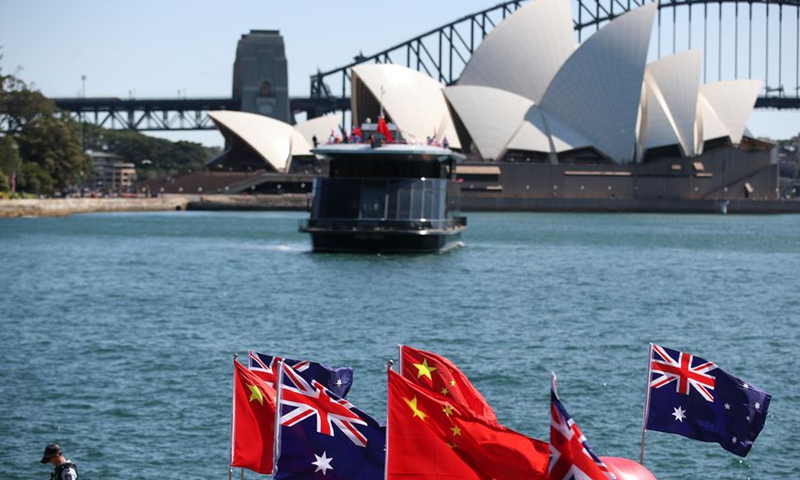
Photo taken on Sep 8, 2019 shows the Chinese and Australian national flags on a celebration event in Sydney, Australia.Photo:Xinhua
Chinese investors are buying more Australian real estate as part of pent-up demand caused by the coronavirus, but experts said that other factors such as rising bilateral tensions and a drop in Australian housing value may lead some Chinese buyers to reconsider their future deals in the country.
Chinese buyers are keen on property investment in overseas markets including Australia, partially driven by the strong demand for Chinese students to study in Australia, as well as the high rates of appreciation of real estate. Sydney home prices rose 3.7 per cent in March and 6.7 per cent in the first three months of 2021, open data showed.
A manager with a real estate agency surnamed Zhao told the Global Times that although Chinese buyers cannot go to Australia at present due to the ongoing pandemic, it does not affect their enthusiasm to buy property there.
"Recently, purchases by Chinese clients have more than tripled from a year ago," said Zhao, noting that the trend was partially driven by the escalation of US' monetary easing.
Most clients are looking at small investments, involving an apartment in a first-tier city with a down payment of 200,000 yuan ($30,900), Zhao said.
Almost 80 percent of the clients have never been to Australia, industry insiders said, noting that they make their decisions mainly through viewing online pictures, videos, Google maps and other methods.
Australia is second by search volume, with a welcoming vibe, easy time difference and quick flight connections among the top draws for Chinese buyers, the South China Morning Post reported on Wednesday.
However, Zhao admitted that the rising tension in bilateral relations has made the growth hard to sustain.
A buyer of Australian real estate surnamed Liu told the Global Times on condition of anonymity that he is hesitating to buy a house in Australia as bilateral tensions show no sign of easing.
"One big concern is whether the Australian government will launch any sanctions targeting Chinese investors or their properties," said Liu, noting that the ongoing pandemic, especially after the latest Indian outbreak, has posed additional concerns.
Other factors that would delay buyers' decisions include a possible decline of the number of Chinese students in Australia, who are often important contributors to the local housing market.
Under the terms of the student visa, Chinese students can buy property in Australia. Many Chinese investors would purchase an apartment for their children to live in while they study there.
However, a series of attacks on Chinese students in multiple places in Australia at the beginning of the year have posed rising threat to their personal safety, leading China's Ministry of Education to issue a fresh warning on studying in Australia in February.
Chen Hong, a professor and director of the Australian Studies Center at the East China Normal University, told the Global Times on Wednesday that Australia had been a very attractive destination for Chinese home buyers, but the recent surge could be the result of earlier buying plans cut short by the COVID-19 pandemic.
"Some buyers had plans to buy properties in Australia before the outbreak. The recent easing of the situation in both countries has prompted Chinese investors to make the purchases as they originally planned," said Chen.
But the current growth is also characterized by growing uncertainties.
"Some Chinese buyers don't have imperative needs to buy Australian properties," said Chen, noting that it used to be families with children studying in Australia who were the major group of purchasers.
With Australia's travel restrictions for international students, home-buying has cooled. With increasing uncertainties in bilateral relations now, investment plans are becoming more complicated.
Investment is like the canary in a coal mine, and individual investors, who are risk-averse, should have a more rational attitude based on realistic considerations, warned Chen.
"Multiple factors including the deteriorating relationship between China and Australia and the resurgence of COVID-19 in India and elsewhere call for utmost prudence in making investment decisions," said Chen.




